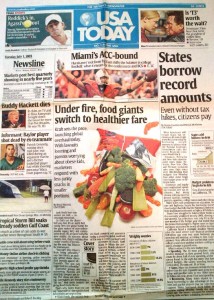If we want food companies to act ethically…
I was fascinated to read Michael Mudd’s piece in the New York Times on Sunday, “How to force ethics on the food industry.” Noting that the court overturned Mayor Bloomberg’s 16-ounce soda ban, he said:
But governments should not be deterred by this and should step up their efforts to protect the public health by limiting the marketing tactics of food companies. Anyone who believes these interventions are uncalled-for doesn’t know the industry the way I do.
…The industry is guilty because it knew what the consequences of its actions might be. Large food processors employed a flock of Ph.D. nutritionists and food scientists. The connection between calorie consumption and weight gain was always as plain as the number on the bathroom scale. But instead of acknowledging this and taking corrective action to sell a better product more responsibly, food processors played innocent by blending in with the crowd of causes.
This sent me to dig through my files to search for what I’d saved about Mr. Mudd’s efforts at Kraft. Here, for example, is the front page of USA Today, July 1, 2003. Kraft chose USA Today to announce its new anti-obesity initiatives, and gave it an exclusive to do so.
The initiatives included, among a long list, elimination of all in-school marketing, setting nutritional criteria for marketing practices, and establishing meaningful criteria for health claims.
Even at the time, I was dubious:
They have to demonstrate what it is they’re actually doing before I can start turning cartwheels about this…Kraft has other credibility problems when it comes to marketing healthier products…Philip Morris Co., the tobacco giant now called Altria Group, owns 84 percent of Kraft [Altria sold off Kraft in 2007].
One year later, Kraft announced that it had begun to act on its promises. After another six months, Kraft introduced its Sensible Solution program to label “better-for-you” products. leaving plenty to be dubious about. By 2004, Michael Mudd was no longer with Kraft.
In 2007, I sent a couple of students out to see whether Kraft had kept its promises. Not a chance, as we documented.
How come? Food companies are not social service agencies. Their job is to sell products. And, as Michael Moss explains in Salt, Sugar, Fat, they must do whatever it takes to achieve that goal.
As Mr. Mudd now puts it,
It’s time to end the charade and mandate the needed changes that the industry has refused to make.


